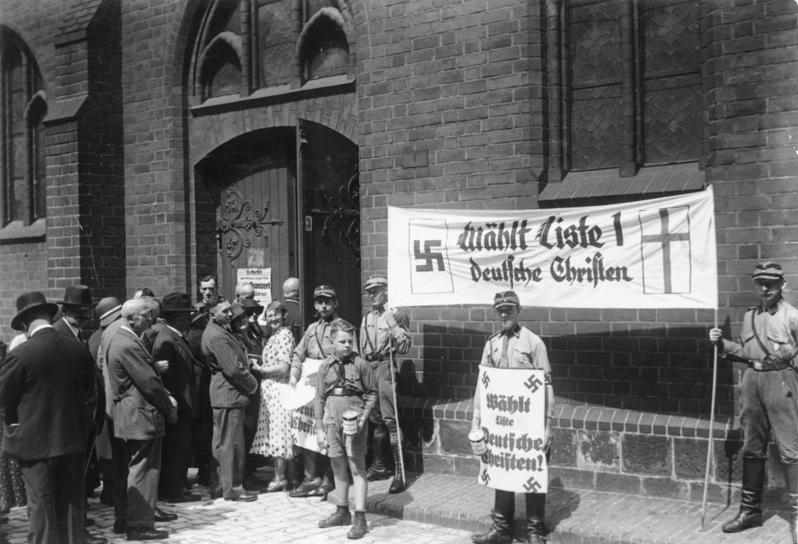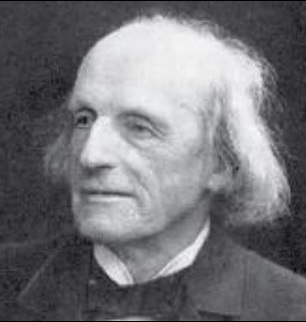|
Julius Schniewind
Julius Schniewind (28 May 1883 - 7 September 1948) was a German evangelical (Lutheran) theologian. He came to prominence in the 1930s as a leader of the Confessing Church (''"Bekennende Kirche"''), which can be seen as a movement within German Protestantism that arose during the Nazi years in opposition to government-sponsored efforts to unify all Protestant churches into a single pro-Nazi Protestant Reich Church. See drop-down essay on "Unification, World Wars, and Nazism" Life Provenance and early years Julius Daniel Schniewind was born in Elberfeld, a town in the Ruhr region which had emerged during the nineteenth century as a major centre for the textiles industry, and which has subsequently been subsumed into Wuppertal. His father, also called Julius Schniewind (1847-1902) worked in the silk business and was a partner in the Elbersfeld-based firm "H. E. Schniewind". His grandfather, Heinrich Ernst Schniewind (1813-1895), had also been a partner in the family f ... [...More Info...] [...Related Items...] OR: [Wikipedia] [Google] [Baidu] |
Elberfeld
Elberfeld is a municipal subdivision of the German city of Wuppertal; it was an independent town until 1929. History The first official mentioning of the geographic area on the banks of today's Wupper River as "''elverfelde''" was in a document of 1161. Etymologically, ''elver'' is derived from the old Low German word for "river." (See etymology of the name of the German Elbe River; cf. North Germanic ''älv''.) Therefore, the original meaning of "elverfelde" can be understood as "field on the river." Elverfelde received its town charter in 1610. In 1726, Elias Eller and a pastor, Daniel Schleyermacher, founded a Philadelphian society. They later moved to Ronsdorf in the Duchy of Berg, becoming the Zionites, a fringe sect. In 1826 Friedrich Harkort, a famous German industrialist and politician, had a type of suspension railway built as a trial and ran it on the grounds of what is today the tax office at Elberfeld. In fact the railway, the Schwebebahn Wuppertal, was e ... [...More Info...] [...Related Items...] OR: [Wikipedia] [Google] [Baidu] |
Protestant Reich Church
The German Evangelical Church (german: Deutsche Evangelische Kirche) was a successor to the German Evangelical Church Confederation from 1933 until 1945. The German Christians, an antisemitic and racist pressure group and ''Kirchenpartei'', gained enough power on boards of the member churches to be able to install Ludwig Müller to the office of ' in the 1933 church elections. The German Evangelical Church Confederation was subsequently renamed the German Evangelical Church. In 1934, the German Evangelical Church suffered controversies and internal struggles which left member churches either detached or reorganised into German Christians-led dioceses of what was to become a single, unified Reich Church compatible with Nazi ideology for all of Nazi Germany. In 1935, in wake of controversies and church struggles, the Ministry for Church Affairs removed Ludwig Müller and installed a committee headed by Wilhelm Zoellner to lead the confederation. As a result, the German Evange ... [...More Info...] [...Related Items...] OR: [Wikipedia] [Google] [Baidu] |
Paul The Apostle
Paul; grc, Παῦλος, translit=Paulos; cop, ⲡⲁⲩⲗⲟⲥ; hbo, פאולוס השליח (previously called Saul of Tarsus;; ar, بولس الطرسوسي; grc, Σαῦλος Ταρσεύς, Saũlos Tarseús; tr, Tarsuslu Pavlus; la, Paulus Tarsensis AD), commonly known as Paul the Apostle and Saint Paul, was a Apostles in the New Testament, Christian apostle who spread the Ministry of Jesus, teachings of Jesus in the Christianity in the 1st century, first-century world. Generally regarded as one of the most important figures of the Apostolic Age, he founded Early centers of Christianity, several Christian communities in Asia Minor and Europe from the mid-40s to the mid-50s AD. According to the New Testament book Acts of the Apostles, Paul was a Pharisees, Pharisee. He participated in the Persecution of Christians in the Roman Empire, persecution of early Disciple (Christianity), disciples of Jesus, possibly Hellenistic Judaism, Hellenised diaspora Jews converte ... [...More Info...] [...Related Items...] OR: [Wikipedia] [Google] [Baidu] |
Licentiate (degree)
A licentiate (abbreviated Lic.) is an academic degree present in many countries, representing different educational levels. It may be similar to a master's degree when issued by pontifical universities and other universities in Europe, Latin America, and Syria. The term is also used for a person who holds this degree. Etymology The term derives from Latin ''licentia'', "freedom" (from Latin ''licēre'', "to be allowed"), which is applied in the phrases ''licentia docendi'' (also ''licentia doctorandi''), meaning "permission to teach", and ''licentia ad practicandum'' (also ''licentia practicandi''), meaning "permission to practice", signifying someone who holds a certificate of competence to practise a profession. History The Gregorian Reform of the Catholic Church led to an increased focus on the liberal arts in episcopal schools during the 11th and 12th centuries, with Pope Gregory VII ordering all bishops to make provisions for the teaching of liberal arts. Chancell ... [...More Info...] [...Related Items...] OR: [Wikipedia] [Google] [Baidu] |
Martin Kähler
Martin Kähler (6 January 1835 – 7 September 1912) was a German theologian. He is best known for his short work, published in 1892, ''Der sogenannte historische Jesus und der geschichtliche, biblische Christus'' (The so-called historical Jesus and the historic, biblical Christ). Kähler was born in Neuhausen near Königsberg and died in Freudenstadt. He had a profound impact upon the famous Protestant theologian, Paul Tillich. According to Kähler, the quest for the historical Jesus ("The Life-of-Jesus research") is challenged by there existing no historical biographies of the life of Jesus. The gospels serve as our only sources, and they are limited in scope, leaving many unanswered questions. One must resist the urge to speculate too much about the life of Jesus, as some historical analogies and psychoanalyses do. He concludes that we do not need to know all the details about Jesus' life. All we really need to know is that Jesus died for the sins of the world. It is throu ... [...More Info...] [...Related Items...] OR: [Wikipedia] [Google] [Baidu] |
Friedrich Loofs
Friedrich Loofs (19 June 1858 in Hildesheim 13 January 1928 in Halle an der Saale) was a German theologian and church historian best remembered for his studies involving the history of dogma. Biography He studied theology at the universities of Leipzig, Tübingen, and Göttingen, and received his doctorate from Leipzig in 1881. As a student, Adolf von Harnack (Leipzig) and Albrecht Ritschl (Göttingen) were important influences to his career. From 1888 to 1926 he was a professor of church history at the University of Halle, where in 1907/08 he served as rector.Loofs, Friedrich at Deutsche Biographie Concurrent with his work at the university, from 1890 to 1925, he held title of ''Consistorialrat'' in the city of |
Karl Heim
Karl Heim (20 January 1874 – 30 August 1958) was a professor of dogmatics at Münster and Tübingen. He retired in 1939. His idea of God controlling quantum events that do and would seem otherwise random has been seen as the precursor to much of the current studies on divine action. His current influence upon religion and science theology has been compared in degree to that of the physicist and theologian Ian Barbour and of the scientist and theological organizer Ralph Wendell Burhoe. His doctrine on the transcendence of God has been thought to anticipate important points of later religious and science discussions, including the application of Thomas Kuhn's idea of a paradigm to religion and Thomas F. Torrance's theory of multileveled knowledge. Mention of Heim's physical and theological concept of extra-dimensional space can be found in a 2001 puzzle book by the popular mathematics writer Martin Gardner. His concept of space has also been discussed by Ian Barbour himself, ... [...More Info...] [...Related Items...] OR: [Wikipedia] [Google] [Baidu] |
Theology
Theology is the systematic study of the nature of the divine and, more broadly, of religious belief. It is taught as an academic discipline, typically in universities and seminaries. It occupies itself with the unique content of analyzing the supernatural, but also deals with religious epistemology, asks and seeks to answer the question of revelation. Revelation pertains to the acceptance of God, gods, or deities, as not only transcendent or above the natural world, but also willing and able to interact with the natural world and, in particular, to reveal themselves to humankind. While theology has turned into a secular field , religious adherents still consider theology to be a discipline that helps them live and understand concepts such as life and love and that helps them lead lives of obedience to the deities they follow or worship. Theologians use various forms of analysis and argument ( experiential, philosophical, ethnographic, historical, and others) to help u ... [...More Info...] [...Related Items...] OR: [Wikipedia] [Google] [Baidu] |
Lutheranism
Lutheranism is one of the largest branches of Protestantism, identifying primarily with the theology of Martin Luther, the 16th-century German monk and Protestant Reformers, reformer whose efforts to reform the theology and practice of the Catholic Church launched the Reformation, Protestant Reformation. The reaction of the government and church authorities to the international spread of his writings, beginning with the ''Ninety-five Theses'', divided Western Christianity. During the Reformation, Lutheranism became the state religion of numerous states of northern Europe, especially in northern Germany, Scandinavia and the then-Livonian Order. Lutheran clergy became civil servants and the Lutheran churches became part of the state. The split between the Lutherans and the Roman Catholics was made public and clear with the 1521 Edict of Worms: the edicts of the Diet (assembly), Diet condemned Luther and officially banned citizens of the Holy Roman Empire from defending or propagatin ... [...More Info...] [...Related Items...] OR: [Wikipedia] [Google] [Baidu] |
Bremen
Bremen (Low German also: ''Breem'' or ''Bräm''), officially the City Municipality of Bremen (german: Stadtgemeinde Bremen, ), is the capital of the Germany, German States of Germany, state Bremen (state), Free Hanseatic City of Bremen (''Freie Hansestadt Bremen''), a two-city-state consisting of the cities of Bremen and Bremerhaven. With about 570,000 inhabitants, the Hanseatic League, Hanseatic city is the List of cities in Germany by population, 11th largest city of Germany and the second largest city in Northern Germany after Hamburg. Bremen is the largest city on the River Weser, the longest river flowing entirely in Germany, lying some upstream from its River mouth, mouth into the North Sea, and is surrounded by the state of Lower Saxony. A commercial and industrial city, Bremen is, together with Oldenburg (city), Oldenburg and Bremerhaven, part of the Bremen/Oldenburg Metropolitan Region, with 2.5 million people. Bremen is contiguous with the Lower Saxon towns of Delmenhor ... [...More Info...] [...Related Items...] OR: [Wikipedia] [Google] [Baidu] |

.jpg)



.jpg)
